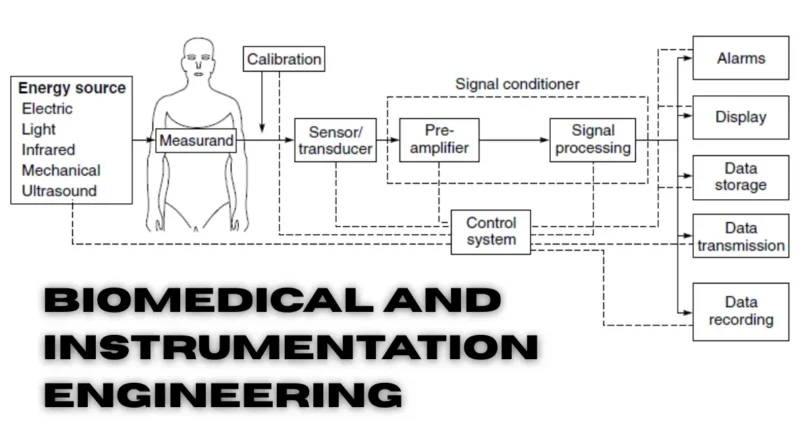Biomedical and instrumentation engineering is a field that combines technology with healthcare to improve human lives. It focuses on designing, developing, and maintaining medical devices and equipment that are crucial for patient care. From heart monitors to advanced imaging systems, biomedical and instrumentation engineering plays a key role in making healthcare more effective and accessible. This exciting field offers many opportunities for innovation, helping doctors and hospitals provide better care and treatments.
In this article, we will explore what biomedical and instrumentation engineering is, how it works, and why it’s so important in today’s world. Whether you’re interested in technology or healthcare, this field offers a rewarding career with endless possibilities.
What is Biomedical Engineering?
Definition and Core Concepts
- Biomedical engineering is the application of engineering principles to the medical and healthcare fields.
- It combines biology, medicine, and engineering to design solutions that improve human health.
- The goal is to create medical devices, systems, and technologies that help diagnose, treat, and monitor patients.
- Biomedical engineers work closely with doctors and healthcare professionals to develop tools that save lives.
Key Applications in Healthcare
- Medical Devices
- Engineers design and improve devices like pacemakers, insulin pumps, and prosthetics.
- These devices help patients manage chronic conditions and improve their quality of life.
- Diagnostic Equipment
- Biomedical engineers work on equipment like MRI machines, X-ray machines, and ECG monitors.
- These tools help doctors detect diseases and conditions early, leading to better treatment outcomes.
- Health Monitoring Systems
- Engineers create wearable devices that track heart rate, blood sugar, or sleep patterns.
- These systems help patients and doctors monitor health in real-time, often reducing hospital visits.
- Rehabilitation Technologies
- Biomedical engineers design rehabilitation equipment such as robotic exoskeletons for patients recovering from injury.
- These technologies help improve mobility and recovery, making rehabilitation more effective.
What is Instrumentation Engineering?
Definition and Role in Various Industries
- Instrumentation engineering involves designing, developing, and maintaining instruments used to measure and control physical variables like pressure, temperature, and flow.
- It plays a key role in industries such as manufacturing, energy, aerospace, and healthcare by ensuring systems run smoothly and safely.
- Engineers in this field focus on making devices more accurate, reliable, and efficient for specific applications.
- They work with sensors, controllers, and automation systems to monitor and control processes in real-time.
How Instrumentation is Used in Medicine and Healthcare
- Monitoring Vital Signs
- Instrumentation is used to create systems that monitor heart rate, blood pressure, and oxygen levels.
- These systems provide real-time data, helping doctors make quick decisions in critical situations.
- Medical Imaging
- Engineers design and improve instruments used in MRI, X-ray, and ultrasound machines.
- These imaging tools help doctors see inside the body without surgery, enabling accurate diagnosis.
- Patient Care Equipment
- Instrumentation is used in creating life-saving devices like ventilators, infusion pumps, and dialysis machines.
- These tools help manage critical patient care, ensuring safety and comfort.
- Laboratory Instruments
- In medical labs, instruments are used to perform tests such as blood analysis, chemical testing, and microbiological analysis.
- These instruments provide accurate data to support diagnosis and treatment planning.
Interconnection Between Biomedical and Instrumentation Engineering
How These Two Fields Work Together
- Biomedical and instrumentation engineering collaborate to design and develop advanced medical technologies that directly impact patient care.
- Biomedical engineers focus on the medical and biological aspects, while instrumentation engineers work on the precision and control of the instruments used in healthcare.
- The combination of knowledge from both fields ensures that medical devices are not only effective but also accurate, reliable, and safe for patient use.
- Working together, these engineers create systems that can monitor, diagnose, and treat various medical conditions.
Examples of Combined Applications
- Medical Equipment
- Pacemakers: Biomedical engineers design pacemakers, while instrumentation engineers focus on making them more reliable, precise, and safe to use.
- These devices help regulate heart rhythms, ensuring patients’ hearts beat at a proper pace.
- Health Monitoring Systems
- Wearable Devices: Biomedical engineers create wearable health monitors, and instrumentation engineers enhance them with sensors and controllers for accurate tracking of vital signs.
- Devices like smartwatches and fitness trackers help patients monitor their health in real-time, providing data for early diagnosis.
- Diagnostic Tools
- MRI and X-ray Machines: Biomedical engineers develop the medical aspects of these machines, while instrumentation engineers ensure they work with precision, delivering clear images.
- These technologies are crucial for diagnosing a wide range of medical conditions, from broken bones to tumors.
- Robotic Surgery Systems
- Surgical Robots: Biomedical engineers design the robotic systems for precise surgery, and instrumentation engineers develop the sensors and controllers that allow for delicate, accurate movements.
- These robots assist surgeons in performing minimally invasive procedures, reducing recovery times for patients.
Key Technologies in Biomedical and Instrumentation Engineering
Wearable Medical Devices
- Wearable devices monitor vital signs like heart rate, blood pressure, and glucose levels in real time.
- These devices help patients manage chronic conditions, offering continuous health data without frequent hospital visits.
- Examples include smartwatches that track fitness metrics and medical-grade wearables for heart or glucose monitoring.
- They provide instant feedback, enabling early detection of health issues and improving preventive care.
Robotics and Automation in Surgery
- Robotics in surgery enhances precision, allowing surgeons to perform delicate operations with greater accuracy.
- Robotic systems like the da Vinci Surgical System enable minimally invasive procedures, reducing recovery time for patients.
- Automation in surgery helps in repetitive tasks, improving efficiency and reducing human error during procedures.
- Surgeons use robotic arms controlled via computers, with real-time data integration, for safer and more effective surgeries.
Diagnostic Equipment (e.g., MRI, ECG)
- Diagnostic equipment like MRI (Magnetic Resonance Imaging) and ECG (Electrocardiogram) provide essential insights into patients’ health.
- MRI machines create detailed images of organs and tissues, helping in the diagnosis of diseases like cancer or neurological disorders.
- ECG machines monitor the electrical activity of the heart, detecting irregularities like arrhythmias or heart attacks.
- These technologies allow doctors to make accurate diagnoses and create effective treatment plans for patients.
Skills Needed for Biomedical and Instrumentation Engineering
Technical Skills
- Programming: Knowledge of programming languages like C, C++, Python, or MATLAB is essential for developing software used in medical devices and instrumentation systems.
- Electronics: Engineers need to understand circuits, sensors, and control systems to design and maintain biomedical devices and instrumentation.
- Mechanical Engineering: Understanding mechanical systems is important, especially for designing devices that interact with the human body, like prosthetics and robotic systems.
- Data Analysis: Engineers need to be able to analyze complex data from medical devices and diagnostic tools to improve their performance and accuracy.
Soft Skills
- Problem-Solving: Engineers often face challenges in designing or improving systems. Strong problem-solving skills are needed to find practical and innovative solutions.
- Communication: Effective communication is key, especially when working with doctors, healthcare professionals, or team members to ensure designs meet medical needs.
- Teamwork: Biomedical and instrumentation engineers often work in multidisciplinary teams, requiring collaboration with experts from various fields.
- Attention to Detail: Precision is critical in healthcare technology, so engineers must pay close attention to the details when designing or testing equipment.
Career Opportunities in Biomedical and Instrumentation Engineering
Job Roles and Sectors
- Biomedical Engineer: Works in designing and developing medical devices like prosthetics, pacemakers, and diagnostic tools.
- Instrumentation Engineer: Focuses on designing and maintaining the systems and instruments used to monitor and control medical equipment.
- Clinical Engineer: Manages medical devices in hospitals, ensuring they are working properly and safely.
- Research and Development (R&D): Engineers in R&D roles innovate new medical technologies and improve existing ones.
- Manufacturing Engineer: Works in the production of medical devices, ensuring they meet industry standards and quality.
Sectors of Employment
- Hospitals and Healthcare Facilities: Engineers in hospitals support the use and maintenance of medical equipment and systems.
- Research Labs: Many biomedical and instrumentation engineers work in research labs to develop new technologies or improve existing devices.
- Medical Device Manufacturers: Companies that design and produce medical equipment offer numerous opportunities for engineers to work on innovative devices.
- Government and Regulatory Agencies: Some engineers work for agencies that ensure medical devices meet safety standards.
Growth Prospects and Salary Expectations
- Job Growth: The demand for biomedical engineers is expected to grow rapidly due to an aging population and the need for advanced medical technologies.
- Salary Expectations: Biomedical and instrumentation engineers generally earn competitive salaries, with the average salary ranging from $60,000 to $100,000 annually, depending on experience and role.
- Career Advancement: With experience, engineers can move into higher roles like project manager, senior engineer, or even director of R&D.
- Innovation Opportunities: As healthcare technology continues to evolve, engineers have the chance to work on cutting-edge projects that shape the future of medicine.
Future Trends in Biomedical and Instrumentation Engineering
AI and Machine Learning in Healthcare
- AI-Powered Diagnostics: Machine learning algorithms are being used to analyze medical data, such as images from MRIs or CT scans, to assist doctors in diagnosing diseases more accurately and quickly.
- Personalized Treatment Plans: AI systems can analyze patient data to recommend tailored treatment options, improving outcomes by considering individual health conditions and genetic information.
- Predictive Analytics: AI is helping predict potential health risks, such as heart attacks or diabetes, by analyzing historical patient data and identifying patterns.
- Robotics and Automation: Machine learning is improving surgical robots by enabling them to learn from previous procedures, enhancing precision and reducing human error during surgeries.
Innovations in Medical Devices and Diagnostics
- Wearable Health Devices: Devices like smartwatches are becoming more advanced, now capable of monitoring a wider range of health metrics, from blood oxygen levels to detecting early signs of disease.
- Point-of-Care Diagnostics: New, portable diagnostic tools allow for quicker, on-the-spot testing, providing results within minutes instead of hours or days. These tools are especially useful in remote or underserved areas.
- Nanotechnology: Tiny devices are being developed to deliver medicine directly to the cells or target specific areas in the body, improving the efficiency of treatments and reducing side effects.
- 3D Printing in Healthcare: 3D printing is being used to create custom prosthetics, implants, and even tissues, allowing for better patient-specific solutions and faster recovery times.
Common FAQs on Biomedical and Instrumentation Engineering
What is biomedical and instrumentation engineering?
Biomedical and instrumentation engineering combines engineering principles with healthcare to design medical devices, diagnostic equipment, and systems that monitor and treat patients.
What are the main responsibilities of a biomedical engineer?
A biomedical engineer designs and develops medical devices like pacemakers, prosthetics, and diagnostic machines, working to improve healthcare technology.
How does instrumentation engineering contribute to healthcare?
Instrumentation engineering focuses on designing and maintaining the tools used to measure and control medical devices, ensuring accuracy and safety in patient care.
What technologies are used in biomedical and instrumentation engineering?
Some key technologies include wearable health devices, robotic surgery systems, diagnostic tools like MRI machines, and AI-driven healthcare solutions.
What skills are needed for a career in biomedical and instrumentation engineering?
Essential skills include knowledge of programming, electronics, mechanical systems, problem-solving, teamwork, and good communication.
What are the career opportunities in this field?
Careers include roles like biomedical engineer, clinical engineer, research and development specialist, and instrumentation engineer, with opportunities in hospitals, research labs, and medical device companies.
What is the salary range for biomedical and instrumentation engineers?
Salaries typically range from $60,000 to $100,000 annually, depending on experience and the role.
Conclusion
Biomedical and instrumentation engineering are key to shaping the future of healthcare. From advanced medical devices and diagnostic tools to the integration of AI and machine learning, these fields are making healthcare smarter and more efficient.
As technology continues to evolve, the opportunities for innovation in patient care will only grow, making this an exciting and impactful area to be a part of. Whether you’re interested in improving medical equipment or designing life-saving technologies, this field offers endless possibilities for those passionate about technology and health.







